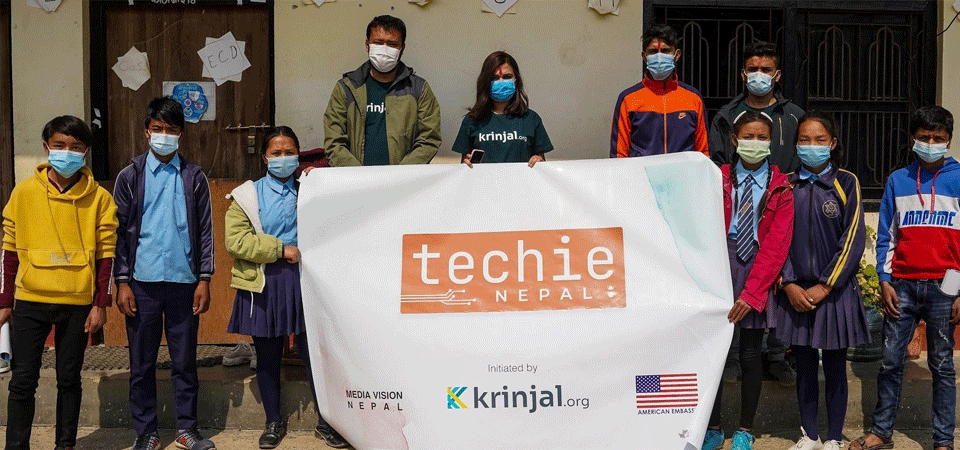Techie Nepal on mission to impart STEM education to rural students

By Aashish Mishra
Kathmandu, Apr. 18: Krinjal Foundation in collaboration with Media Vision Nepal and support from the Embassy of the United States of America in Nepal is on a mission to help students of rural areas obtain science, technology, engineering and mathematics (STEM) education and learn digital skills through the initiative Techie Nepal.
The multi-phased initiative, which aims to teach 600 government-school students, particularly those from grades nine to 12, from six districts of Nepal Python coding and digital designing through creative intensive workshops, is an effort to reduce the digital divide and expand access to technology, said Aarju Lohani, finance head of the project. Techie Nepal is also a part of the US Embassy’s vision to increase participation in STEM education.
According to Kshitij Raj Lohani, founder of Techie Nepal, the initiative has been designed with inputs from working professionals involved with institutions like Google, Apple and Harvard.
Programme Director Aashish Lamichhane shared that the initiative imparted STEM education because it is the need of the time.
“In today’s world, a country and a society cannot develop unless the people are able to move forward technologically. That is why we have emphasised STEM education,” he said.
Kshitij, further, clarified that Techie Nepal focused on schoolchildren because it would help produce a technologically sound human resource and might motivate them to pursue a career in STEM.
The first phase of Techie Nepal recently kicked off from Bethanchowk Rural Municipality, Kavrepalanchowk on April 2 where 30 students from four schools – Shree Parvati Higher Secondary School, Saraswati Secondary School, Shree Aatma Bikas Secondary School and Krishna Gopal Secondary School – were taught basic coding schools. The team made sure to maintain inclusivity with 50 per cent of participants being girls.
“Girls are often thought of to be less interested in STEM or their participation is not encouraged. But in our programme, we have found that girls are very interested and are very active in grasping the concepts,” Aashish said.
Apsara Lama, a grade 10 student from Shree Aatma Bikas Secondary School, said, “I thought computers would be difficult and would not match my interests. But this initiative has changed my perspective.”
In the two-day programme, the students were introduced to the basics of algorithm development and the execution of Python programming. Because of COVID-19, the team had to divide the students into three three-hour shifts. Following the government’s safety guidelines and the US Embassy’s regulations, the team strictly maintained social distancing, sanitisation and mask-wearing.
“The pandemic threw a monkey wrench into our plans. We would have started much earlier had it not been for the coronavirus-induced restrictions. We had to adjust a lot,” Kshitij said.
Nevertheless, the project is now off the ground and will include further two to three phases which will elaborate on writing Python codes and running them on Raspberry Pi to develop innovative solutions. The second phase will begin by the end of May.
Recent News

Do not make expressions casting dout on election: EC
14 Apr, 2022
CM Bhatta says may New Year 2079 BS inspire positive thinking
14 Apr, 2022
Three new cases, 44 recoveries in 24 hours
14 Apr, 2022
689 climbers of 84 teams so far acquire permits for climbing various peaks this spring season
14 Apr, 2022
How the rising cost of living crisis is impacting Nepal
14 Apr, 2022
US military confirms an interstellar meteor collided with Earth
14 Apr, 2022
Valneva Covid vaccine approved for use in UK
14 Apr, 2022
Chair Prachanda highlights need of unity among Maoist, Communist forces
14 Apr, 2022
Ranbir Kapoor and Alia Bhatt: Bollywood toasts star couple on wedding
14 Apr, 2022
President Bhandari confers decorations (Photo Feature)
14 Apr, 2022









